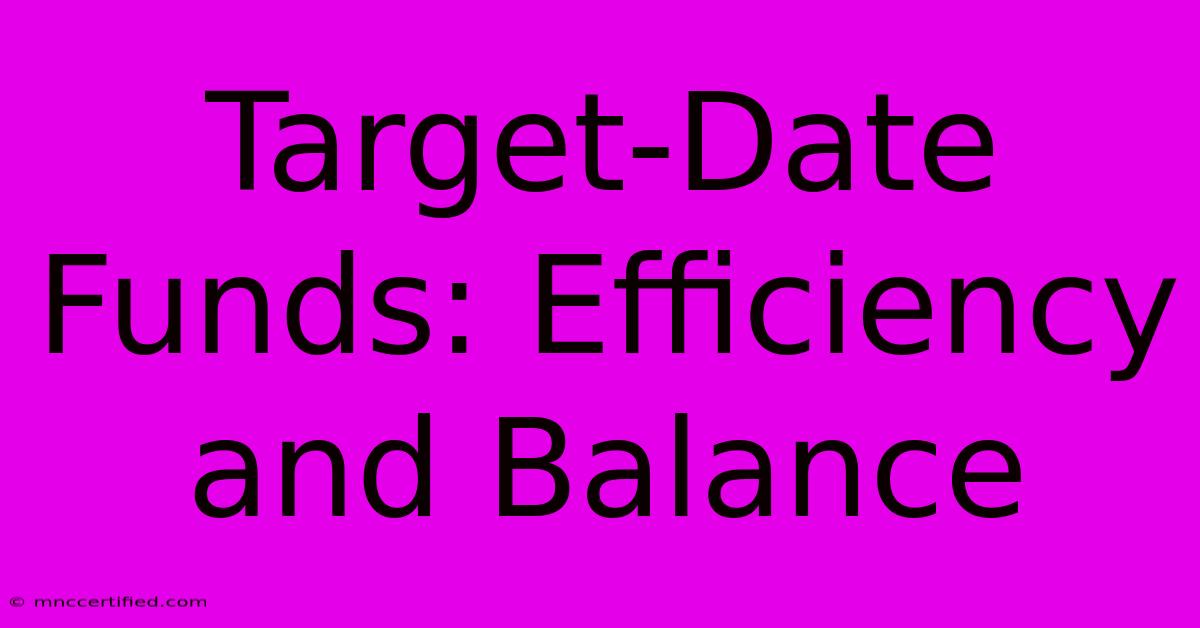Target-Date Funds: Efficiency And Balance

Table of Contents
Target-Date Funds: Efficiency and Balance for Your Retirement
Target-date funds (TDFs) have become increasingly popular as a simple and efficient way to save for retirement. But are they truly the best option for everyone? This article will delve into the efficiency and balance offered by TDFs, exploring their advantages and disadvantages to help you determine if they're right for your financial goals.
What are Target-Date Funds?
Target-date funds are mutual funds or exchange-traded funds (ETFs) designed to automatically adjust their asset allocation over time, aligning with a specific retirement date. The fund's name usually includes a target year, such as "2060" or "2055," indicating the approximate retirement date the fund is geared toward. As the target date approaches, the fund typically shifts from a higher allocation of stocks (higher risk, higher potential return) to a lower allocation of stocks and a higher allocation of bonds (lower risk, lower potential return). This gradual shift aims to reduce risk as retirement nears.
The Advantages of Target-Date Funds: Simplicity and Efficiency
TDFs offer several key advantages, making them attractive to many investors:
-
Simplicity: One of the biggest draws of TDFs is their simplicity. They require minimal investor involvement, making them ideal for beginners or those who prefer a "set it and forget it" approach to investing. The automatic asset allocation adjusts itself based on the target date, eliminating the need for constant monitoring and rebalancing.
-
Diversification: TDFs are inherently diversified, typically investing across various asset classes like stocks, bonds, and sometimes real estate. This diversification helps mitigate risk, as losses in one asset class can be offset by gains in another. This built-in diversification is a significant advantage, particularly for less experienced investors who might struggle to create a well-diversified portfolio on their own.
-
Low Costs: Many TDFs offer relatively low expense ratios compared to actively managed mutual funds. This is crucial because lower fees mean more of your money stays invested and grows over time. Choosing a low-cost TDF can significantly impact your long-term returns.
-
Automatic Rebalancing: TDFs automatically rebalance your portfolio as you approach your target retirement date. This means you don't need to manually adjust your asset allocation to maintain your desired risk level – a significant time-saver and a way to avoid emotional investing decisions.
The Disadvantages of Target-Date Funds: Lack of Customization and Potential Fees
While TDFs provide numerous benefits, they also have some potential drawbacks:
-
Lack of Customization: The pre-set asset allocation might not perfectly align with your individual risk tolerance, financial goals, or investment timeline. If you have specific investment preferences or a more complex financial situation, a TDF might not be the optimal solution.
-
Expense Ratios: While many TDFs offer low expense ratios, some may still have higher fees than index funds or ETFs that you could manage yourself. It's crucial to compare expense ratios across different TDFs before making a decision.
-
Underlying Investments: It's essential to understand the specific investments held within your chosen TDF. Some TDFs might hold investments you disagree with on ethical or environmental grounds.
-
Potential for Underperformance: Although diversification is a key advantage, a TDF might underperform compared to a portfolio managed by a financial advisor who can tailor the strategy to specific market conditions and your unique financial circumstances.
Are Target-Date Funds Right for You?
TDFs are a valuable tool for many investors, especially those seeking a simple, low-cost, and diversified approach to retirement planning. However, they may not be suitable for everyone. Consider these factors:
-
Your Risk Tolerance: Are you comfortable with the level of risk associated with the TDF's asset allocation?
-
Your Investment Knowledge: Do you feel confident managing your investments independently, or would you prefer the simplicity of a TDF?
-
Your Retirement Goals: Does the TDF's target date align with your planned retirement timeline?
-
Your Financial Situation: Does your financial situation allow for a less hands-on approach to retirement investing?
Ultimately, the decision of whether or not to invest in a target-date fund depends on your individual circumstances and financial goals. Consulting with a qualified financial advisor can help you determine if TDFs are the right choice for you or if another investment strategy would be more appropriate.
Keywords: Target-date funds, TDFs, retirement planning, retirement investing, asset allocation, diversification, mutual funds, ETFs, low-cost investing, simplicity, risk tolerance, financial planning, investment strategy.

Thank you for visiting our website wich cover about Target-Date Funds: Efficiency And Balance. We hope the information provided has been useful to you. Feel free to contact us if you have any questions or need further assistance. See you next time and dont miss to bookmark.
Featured Posts
-
Donnarummas Two Word Psg Update
Dec 20, 2024
-
Lilly Jay Breaks Silence On Divorce
Dec 20, 2024
-
Supermans Welcome Return New Hope
Dec 20, 2024
-
Wind Warning Issued Devon And Somerset
Dec 20, 2024
-
Sosa Apologizes Acknowledges Ped Use
Dec 20, 2024